- Details
- Flash Memory
Due to the global impact of the COVID-19 epidemic, many companies are in work-from-home mode. Since a large number of employees may need to log in to the company network remotely and use cloud applications, enterprises may be facing new security threats for the first time. Considering the large volume of data transmission in the 5G era and the high requirements of enterprises for security protection, Apacer, a leading industrial storage and memory brand, created the CoreSecurity2 technology, integrating exclusive four innovative security protection technologies for SSDs. These include: destroying hardware and software if necessary, erasing data thoroughly, encrypting data when reading and writing it, and protecting drives from unauthorized access. This comprehensive approach delivers unparalleled security. It’s ideal for enterprises who need quick and powerful access to close security holes that may have been opened by transitioning to work-from-home mode.
Four Approaches To Strengthening Security for Software, Hardware and Firmware
To better meet the strict security requirements of enterprise customers, Apacer’s industrial-grade SSDs can be shipped with CoreSecurity2 already built in. Take Server and Networking applications as an example. They will benefit particularly from the Encryption upgrades that CoreSecurity2 includes. By adhering to the TCG Opal 2.0 specification, Apacer uses the rock-solid AES 128 and 256 protocols to encrypt all data as its written to the SSD. In addition to providing extremely high security, this approach also allows users to send an Instant Keychange™ trigger command. This is done only when a drive falls into the hands of a bad actor, and will destroy the original security key and replace it with a new one in less than a second. The result is that the data can no longer be decrypted, and the bad actor will be completely unable to access confidential information.
- Details
- Flash Memory
From introducing game-changing new technologies to being the first to deliver PCIe 4.0 U.3 SSDs, KIOXIA America, Inc. (formerly Toshiba Memory America, Inc.), continues to demonstrate its commitment to delivering cutting-edge flash solutions. This dedication will be on full display at this week’s Open Compute Project (OCP) Virtual Summit and Future Technologies Symposium, where KIOXIA will showcase its data center and enterprise solid state drive (SSD) portfolio. At the Summit, KIOXIA will highlight its CM6 and CD6 Series PCIe 4.0 NVMe enterprise and data center SSDs, KumoScale storage software based on NVM Express over Fabrics (NVMe-oF) and a new Software-Enabled Flash (SEF) technology that redefines digital storage.
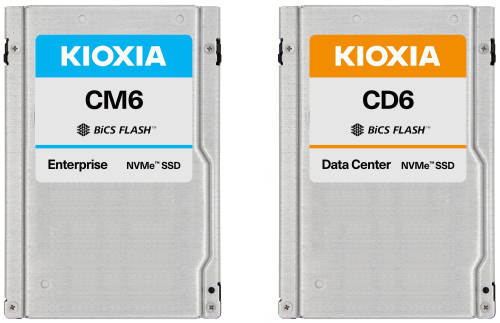
KIOXIA has the broadest portfolio of SSDs in the market, including SSDs for client PCs, data center, hyperscale, high-end servers and storage systems.
Add a comment- Details
- Flash Memory
 Samsung announced today in an OCP Virtual Summit keynote that it has developed a solid state drive (PM9A3 SSD) with a SNIA-based E1.S form factor and full PCIe Gen 4 support to harness the production efficiencies of the company’s sixth-generation (1xx-layer), three-bit V-NAND. At the same time, the company said that it has introduced a comprehensive reference design for its E1.S-based storage system.
Samsung announced today in an OCP Virtual Summit keynote that it has developed a solid state drive (PM9A3 SSD) with a SNIA-based E1.S form factor and full PCIe Gen 4 support to harness the production efficiencies of the company’s sixth-generation (1xx-layer), three-bit V-NAND. At the same time, the company said that it has introduced a comprehensive reference design for its E1.S-based storage system.
The keynote, in addition to announcing the PM9A3, highlighted a new approach to open source multi-industry storage collaboration that spotlighted the development of an open-source platform (OSP) fundamentally tied to cloud-scale infrastructure deployments. It was presented by Jongyoul Lee, senior vice president of Samsung’s Memory Software Development Team at the Open Compute Project Virtual Global Summit.
“Offering the most 1U server-optimized form-factor, the PM9A3 will improve space utilization, add PCIe Gen4 speeds, enable increased capacity and more,” said Mr. Lee. “We see it eventually becoming the most sought-after storage solution on the market for tier one and tier two cloud datacenter servers, and one of the more cost-effective,” he added.
Add a comment- Details
- Flash Memory
Micron Technology, Inc., today announced new client solid-state drives (SSDs) that bring NVMe performance to client computing applications, freeing laptops, workstations and other portables from legacy architectures that can rob devices of battery power, performance and productivity. The Micron 2300 SSD combines the power and density needed to drive compute-heavy applications in a compact form factor with the reduced power consumption modern mobile users demand. For the first time, Micron brings together NVMe performance and low-cost quad-level-cell (QLC) NAND in the Micron 2210 QLC SSD. It combines fast NVMe throughput and Micron’s leadership in QLC technology to offer flash capabilities at hard disk drive-like price points while reducing power consumption by 15 times when compared to hard drives.
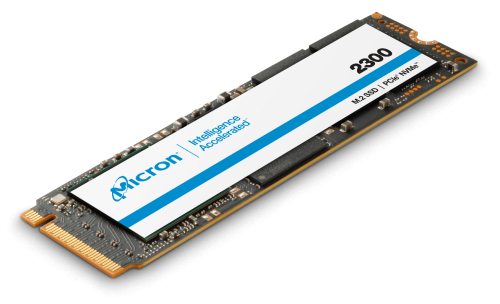
“Ninety percent of client platforms will ship NVMe SSDs within the next year, and the market is fast bifurcating into mainstream and value market segments," said Roger Peene, vice president of marketing, Storage Business Unit, Micron. "Our two new client SSDs, the 2300 and 2210, are optimized for each segment. The 2300 offers outstanding power performance, while the 2210 delivers compelling price performance by using Micron's industry-leading QLC NAND.”
Add a comment- Details
- Flash Memory
ADATA Technology, a leading manufacturer of high-performance DRAM modules and NAND Flash products, today announces the launch of the ADATA Ultimate SU720 SATA 6Gb/s solid state drive (SSD). An ideal offering for those looking to make the switch to SSDs, the SU720 offers great performance and reliability at an amazing value. Equipped with 3D NAND memory and intelligent SLC caching, the SU720 reaches read/write speeds of up to 520/450MB per second.
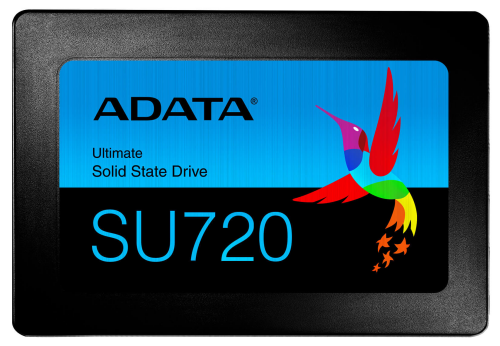
High Capacity. Very Durable. Fast Transmission Speeds.
Implementing advanced 3D NAND Flash, the SU720 features high storage capacities of 5000GB to 1TB, improved efficiency, and rugged reliability with better cost-performance ratios than ever. The SU720 also features continuous read/write speeds of up to 520/450MB per second and supports SLC caching. The SU720 sports data protection and error correction technologies for high endurance and delivers random read/write performance of up to 50K/65K per second, which is up to 2.5 times faster than standard hard drives.
- Details
- Flash Memory
Organizations around the world trust their sensitive data to Kanguru Defender Hardware Encrypted Flash Drives for their flexibility, mobility, and security. Kanguru expands on the Defender family with new 256GB high-capacity drives to help security-conscious organizations get the most out of their investment.
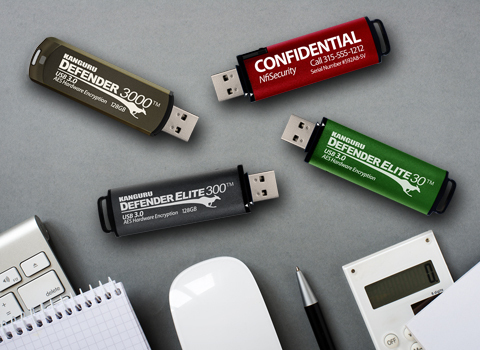
With new 256GB capacities on Kanguru Defender hardware encrypted USB flash drives, users can freely load enormous amounts of information on a single drive, without the worry of sensitive data getting into the wrong hands. Defender encrypted flash drives maintain the highest military-grade standards for secure data storage, with AES-XTS 256-Bit hardware encryption, FIPS 140-2 Certification, remote management capability, digitally-signed secure firmware and tamper-proof protection.
Add a comment- Details
- Flash Memory
KIOXIA America, Inc. (formerly Toshiba Memory America, Inc.) today announced the introduction of Software-Enabled Flash (SEF), a new technology that combines software flexibility, host control and flash native semantics into a flash native API and purpose-built controller. Targeted to data center directors, architects and developers, SEF technology makes flash easier to manage, more timely to deploy and more predictable in nature – putting the power in programmers’ hands.
With hyperscale computing redefining storage and virtualization, the race is on to orchestrate digital storage for cloud applications in a way that drives greater efficiency at scale. Effectively and efficiently utilizing flash for stable, predictable latency in ever-changing cloud workloads through direct host management of flash will quickly be critical to realizing these much-needed efficiencies.
Past efforts to provide a market solution for hyperscalers have not been widely adopted, as these attempts have all been extensions of the HDD paradigm. Taking a completely different approach, KIOXIA designed SEF to free developers from narrowly defined “drive” behaviors by fundamentally changing the relationship between solid-state storage and the host in cloud environments. SEF bypasses legacy HDD storage paradigms to unlock true host control and enable the use of flash at its natural speed.
Add a comment- Details
- Flash Memory
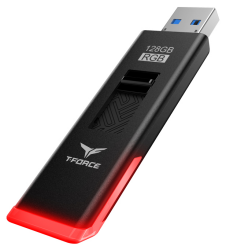 The world’s leading memory brand, TEAMGROUP today announces two new products, the T-FORCE SPARK RGB USB Flash Drive and the ELITE SDXC Memory Card. The T-FORCE SPARK RGB USB Flash Drive has a soft RGB lighting effect and a smart capacity display design to supports multiplatform operation. The ELITE SDXC Memory Card uses UHS-I U3 V30 specification, which is suitable for 4K Ultra HD video recording and shooting with DSLR cameras. It also has waterproof, shockproof, anti-X ray and anti-static functions. The two new products will bring fresh new look to storage devices and jumpstart new digital smart lifestyle for consumers.
The world’s leading memory brand, TEAMGROUP today announces two new products, the T-FORCE SPARK RGB USB Flash Drive and the ELITE SDXC Memory Card. The T-FORCE SPARK RGB USB Flash Drive has a soft RGB lighting effect and a smart capacity display design to supports multiplatform operation. The ELITE SDXC Memory Card uses UHS-I U3 V30 specification, which is suitable for 4K Ultra HD video recording and shooting with DSLR cameras. It also has waterproof, shockproof, anti-X ray and anti-static functions. The two new products will bring fresh new look to storage devices and jumpstart new digital smart lifestyle for consumers.
TEAMGROUP launches the T-FORCE SPARK RGB USB Flash Drive with a capless design and a sliding connector to avoid the problem of losing the cap. The RGB lighting effect is designed with gaming elements and smart capacity status indicator. When connecting to Windows, the blue, yellow and red light will flash to display the capacity ratio during reading and writing. It shows current storage status easily, and this practical function can make a big leap forward in storage efficiency. The SPARK RGB USB Flash Drive is even more suitable for gaming consoles such as PS4™, PS3™, Xbox One™ and Xbox 360®, satisfying gamers’ storage needs at once with colorful RGB lighting.
Add a comment- Details
- Flash Memory
Micron Technology, Inc., today announced the first open-source, heterogeneous-memory storage engine (HSE), designed specifically for solid-state drives (SSDs) and storage-class memory (SCM). Legacy storage engines born in the era of hard disk drives (HDDs) failed to architecturally provide for the increased performance and reduced latency of next-generation nonvolatile media. HSE, originally developed by Micron and now available to the open-source community, is ideal for developers using all-flash infrastructure who require the benefits of open-source software, including the ability to customize or enhance code for their unique use cases.
“As the only company developing storage class memory, flash and DRAM technologies, Micron is uniquely positioned to build a software stack that accelerates applications running in today’s flash-based storage environments as well as storage class memory-based infrastructure of the future,” said Derek Dicker, corporate vice president and general manager of the Storage Business Unit at Micron. “We have delivered a first-of-its-kind innovation for open-source storage developers, unlocking the full potential of high-performance storage applications.”
In addition to delivering performance and endurance improvements, HSE reduces latency, especially for large-scale data sets, through intelligent data placement. HSE improves throughput of particular storage applications by up to six times, reduces latency 11 times1 and improves SSD endurance by seven times. HSE can also take advantage of multiple classes of media concurrently, such as flash and 3D XPoint technology. When a Micron X100 NVMe™ SSD, the world’s fastest SSD, is added to a set of four Micron 5210 QLC SSDs, throughput more than doubles and read latency improves nearly four times.
Add a comment- Details
- Flash Memory
Kingston Digital, Inc., the Flash memory affiliate of Kingston Technology Company, Inc., a world leader in memory products and technology solutions, today announced KC2500, its next generation M.2 NVMe PCIe SSD for desktop, workstations and high-performance computing (HPC) systems. KC2500 NVMe PCIe SSD delivers powerful performance using the latest Gen 3.0 x 4 controller and 96-layer 3D TLC NAND. With speeds up to 3,500MB/s read and up to 2,900MB/s write, KC2500 combines outstanding performance and endurance that improves workflow for desktop, workstation and power users.

KC2500 is available in capacities up to 2TB housed in a compact M.2 2280 form factor that saves space for other components while allowing users to take advantage of PCIe speeds. The self-encrypting SSD supports a full-security suite for end-to-end data protection using AES-XTS 256-bit hardware-based encryption. It allows the usage of independent software vendors with TCG Opal 2.0 security management solutions such as Symantec, McAfee, WinMagic® and others. KC2500 has built-in Microsoft eDrive support, a security storage specification for use with BitLocker.
Add a comment
